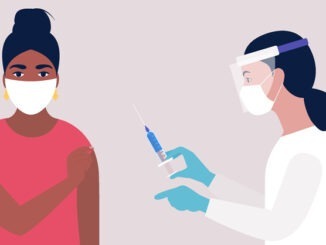
Carmel Loughlin, practice manager, discusses why despite experiencing tough times and challenges it is always best to look for silver linings
Throughout the pandemic working in healthcare, I think we always have to try to see the silver lining. It teaches us to be grateful and to appreciate small things. Since the pandemic started, I have been unbelievably frustrated with the timeliness of information getting to practices. Practice managers all over the country are saying the same thing – why do the media get the information before us! We are the group tasked with getting the vaccines delivered to patients and for giving them relevant information yet the whole country knows before we do about vaccine types, delivery and issues that arise. Same with the flu program and the other vital information that we build our services around.
I listened to a very awkward interview on Radio 4 the other morning where a government minister was asked about the policy changes to the triple lock on pensions and the increase in National Insurance contributions. What transpired was beyond belief. The minister had no detail on these major policy changes and was unable to answer the questions about it, yet, he is tasked with running the country alongside Boris and Co. I felt marginally better until I got into work and read in a newspaper that our flu vaccines were being delayed due to a shortage of lorry drivers! Off I nearly went on a rant again until I thought, silver lining – ‘Well at least someone is telling us something’. My friend was told he had cancer before he had a biopsy which thankfully proved it wasn’t. These are times we are glad that someone is proven wrong, but he had a horrible few days waiting on his biopsy results. Silver lining – it made him re-evaluate his life. He now works part-time and is learning French so he can buy a property for his retirement.
I was forced to isolate due to being a close contact of my positive daughter. She was staying with her sister when she discovered she was positive and had nipped home as she forgot her sunglasses. She kissed and hugged me before she left, the next day she had a high temperature and a cough. I was forced to isolate for 10 days at home alone. The one thing that kept me sane was that I had a work laptop and was able to work for seven hours a day. While I was bored looking out the window at my family and friends who stopped by to wave in, I suddenly had a thought what if life was like this?
While I awoke every morning pre-isolation thinking oh no another day of work, in isolation I was thinking oh no another day I have to get through seeing no-one. The isolation forced me to think, having turned 50 (but look 30!), about my retirement and what that would look like. I lay in bed that night thinking I am used to having days where I mightn’t get a lunch break and work from dawn to dusk. If that suddenly stopped, how would I fill my day? There’s only so much cleaning and walking one person can do! It really made me stop and think.
I skipped into work the following week thinking that although it’s a tough environment to work in I come home every night with a sense of achievement. I get to help people every day which gives me great satisfaction. I work as part of a large and happy team and a huge organisation whose raison d’etre is to help people and hopefully make them better. I wondered how I would cope where my work didn’t fulfil me, challenge me and reward me. We may grumble about our work but it matters to a lot of people that we are here and NO WE ARE NOT SHUT!
We read stuff every day about what we do that is untrue but the people we help are grateful. Despite everything in this pandemic we have proven our worth and our value. The National Insurance increase may be a downer but if it puts money into the services we value and improves them – bring it on! I’d be grateful for reduced waiting lists so that our patients can get their treatment quicker. We need more of everything and the sad fact is it has to be paid for. I hope that we in primary care see the benefits too and that the funding is not pushed completely into secondary care. If it took a pandemic for the government to value and fund the health services, it’s another silver lining.


Be the first to comment